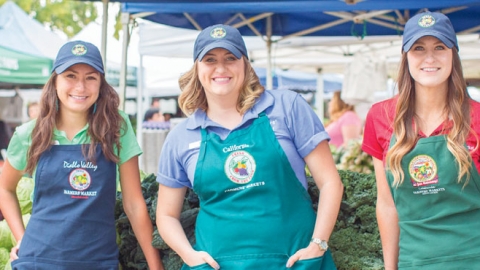Four Women Farmers Who Till the Land, Grow Your Food and Haul it to Market
Greek goddess of fertility and agriculture Demeter earned the respect of her ancient Olympian peers. She revered the soil, drew forth the harvest and wandered from countryside to countryside honoring the earth’s bounty. And while Zeus, Apollo and even dreadful Hades may enjoy better name recognition, Demeter’s role in Greek mythology couldn’t be more crucial: Without her, crops couldn’t grow and the ancients would starve.
Silicon Valley is hardly mythical ancient Greece, but our own Demeters more than merit their due. Meet four farmers who grow our food, from leafy greens and plump tomatoes to juicy berries and crisp broccoli. They haul it to Silicon Valley’s farmers markets, traveling considerable distances to feed us. That they’re women is both beside the point and somehow notable. When many of us picture a “farmer,” we’re more likely to picture a man than a woman.
Here’s to a more inclusive picture.
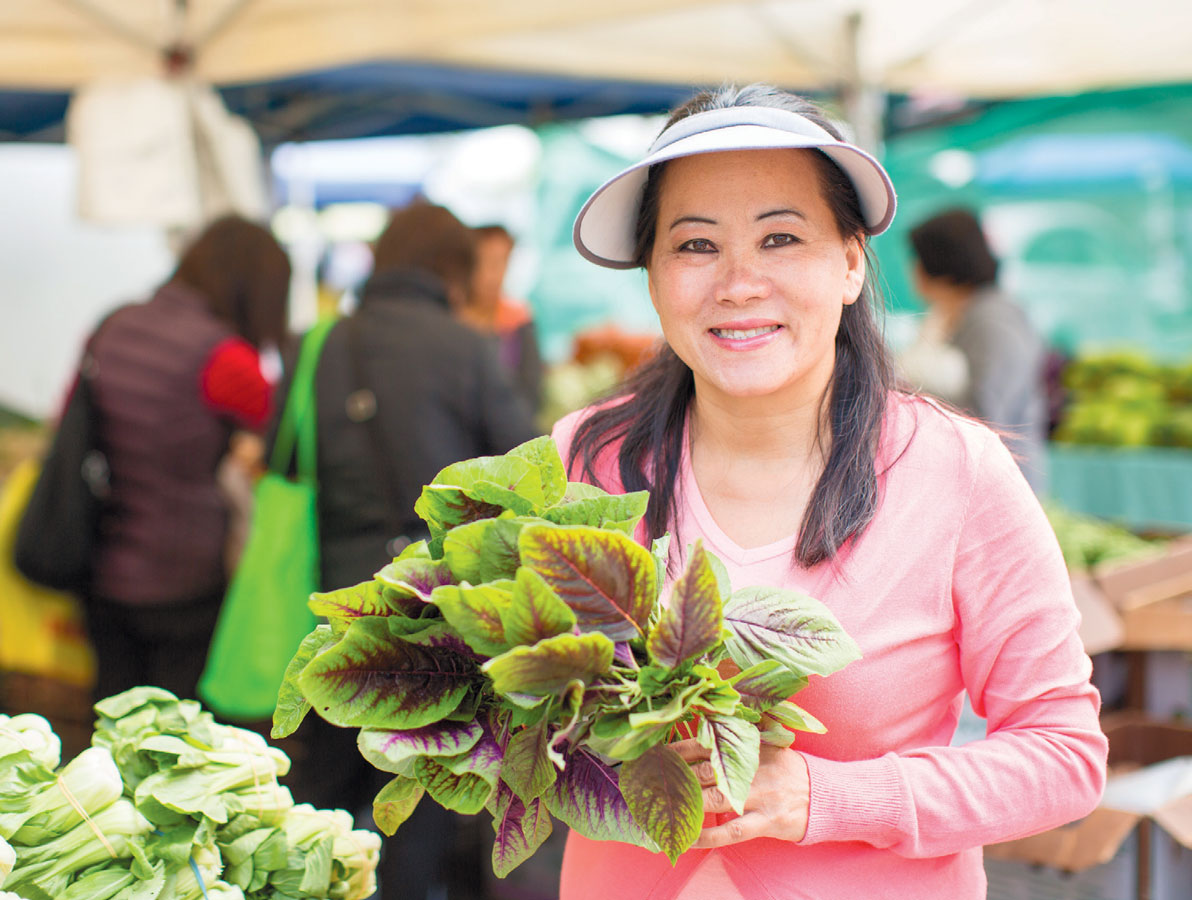
Ivorrie Lo of Yhaj Farm
A steady presence at the Saratoga Farmers Market, Ivorrie Lo is the one with the visor, dispensing advice for how best to prepare sing qua (Chinese okra) while she makes change for her stream of customers.
Lo is working on four hours sleep. This is no exaggeration. In preparation for Saturday’s market, every Friday she wakes up at 4am and works for the next 22 hours, until 2am the following day. “Then I take a shower really fast and go to sleep in the truck.” Her husband, Va Lo, makes the three and half hour drive from Sanger County to Saratoga, then Lo awakes, helps him unpack the truck and sets up their stall. She spends the day selling daikon, eggplant, tomatoes and Asian greens before packing up for the long drive home.
Lo, 46, is Hmong. Born in Laos, she arrived the United States at age 10, in 1980. “We came because of the Vietnam War. We practically ran for our lives.” After a year in Torrance, her parents moved the family to Fresno.
Today, Lo and her husband lease the land where they grow their vegetables. On non-market days, she wakes up at 4am, drives to fetch her workers, then heads to the fields at 5:30am with a flashlight. “It’s still dark,” she says, “but the fragile vegetables need to be picked early.” These include choy leaves, bitter melon, water spinach and more. If she’s doesn’t finish picking before the sun climbs high, she’ll return to those crops after sunset. Meanwhile, she’ll pick hardier cabbages and eggplant.
Despite the punishing hours and physical demands, Lo doesn’t complain about farm life. “It’s indescribable, the work that we do, but we have a roof over our head. Sometimes in life you have to lose something to gain something. You have to sacrifice for the future of your children,” says Lo, who has seven children of her own.
If there’s one thing she wishes farmers market shoppers would better understand, it’s this: “Some people want to save a dollar. They think maybe you just whistle and the vegetable comes to your hand. But planting and picking is hard work.”
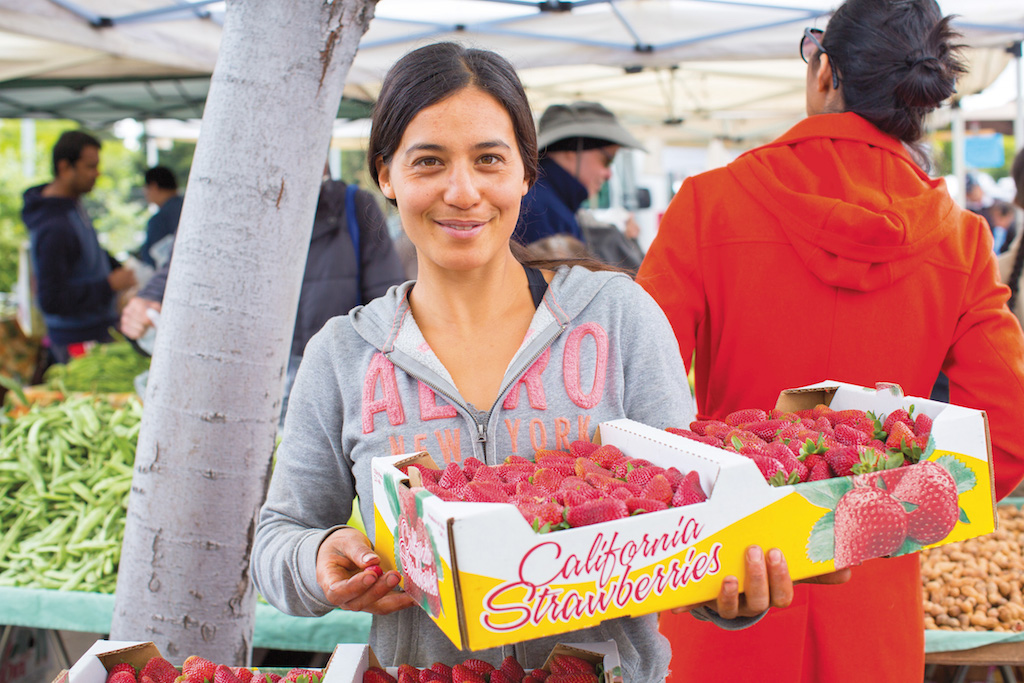
Marsha Habib of Oya Organics
“As a kid in the Bay Area, you don’t get a lot of encouragement to go into farming,” says Marsha Habib, who grows roughly 100 varieties of nearly 30 crops on a 15-acre parcel in Hollister. She sells her produce at farmers markets in South Berkeley, San Mateo, Belmont, Mountain View, Saratoga and Morgan Hill. “The teacher asks what you want to be when you grow up, and kids say doctor or lawyer. I never once heard someone say, ‘I want to go into farming.’”
Best known for heirloom tomatoes and summer squash, Habib, 34, attended Gunn High School in Palo Alto and thought she’d end up becoming a biologist or exercise physiologist, “something mainstream.” But her mother was raised in a family of rice and vegetable farmers in rural Japan, and her Egyptian father’s family included cousins who farmed in Switzerland. When Habib started having motivation problems in high school, she began exploring a life closer to the land.
She became involved with World Wide Opportunities on Organic Farms (WWOOF), a global nonprofit where young people work on small farms for room and board. The experience, which Habib pursued in France and Switzerland, resonated deeply, and after a circuitous detour to pursue her education at several prestigious institutions, she found her way to full-time farming.
Today, Habib speaks fervently about improving agricultural policy, promoting sustainable practices and improving farmers’ rights and access to economic opportunity. She’s using these years as a small-scale farmer to walk the talk … whether she ultimately chooses to keep farming or chooses later to apply her skills in the advocacy realm.
She’s also aware that women who work in agriculture, at least in Hollister, are more commonly found in packinghouses than behind the wheel of a tractor. Not one to accept convention, early on she borrowed tractors and learned how to drive them from fellow farmers. Eventually, she bought her own. “I drove it even after I got pregnant.”
Today, Habib regularly hands her 3-year-old daughter Saori to her husband so she can get her fix in the tractor seat. “It’s still a passion of mine,” she says. “My mother taught me to do whatever I want. ‘You’re just as strong and capable as a man,’ she told me. ‘Don’t depend on anyone else.’”
Callout “My mother taught me to do whatever I want. ‘You’re just as strong and capable as a man,’ she told me. ‘Don’t depend on anyone else.’” —Marsha Habib
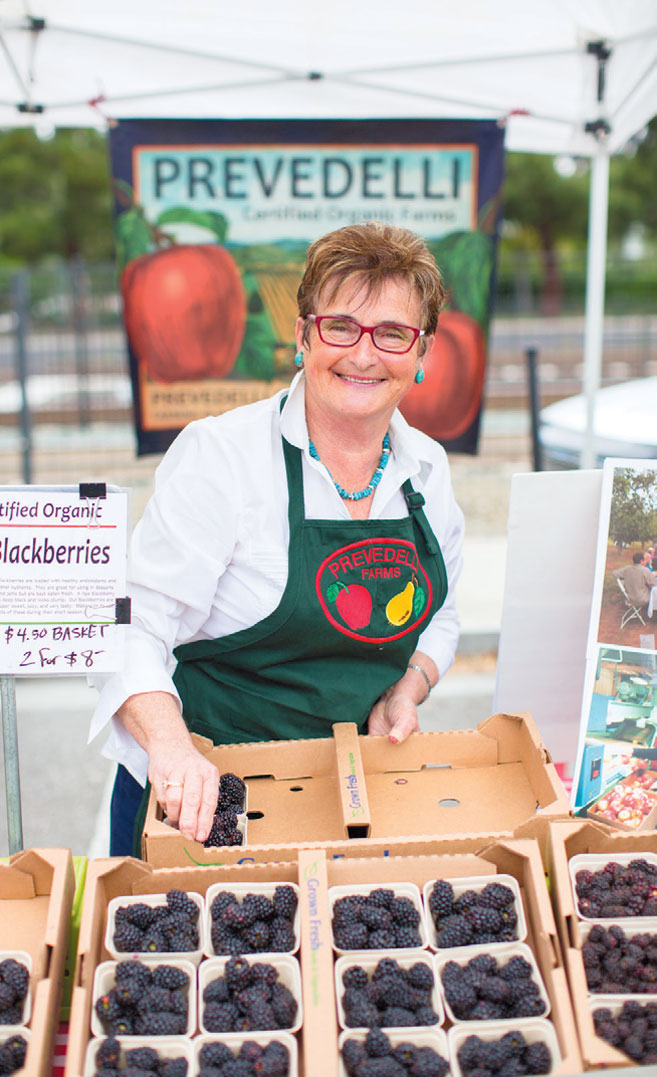
Silvia Prevedelli of Prevedelli Farms
I ask Silvia Prevedelli how old she is, and she laughs, “Just say I’m over 70.”
This Italian-born, Watsonville-based farmer—who in June was named Farmer of the Year by the Santa Cruz Farm Bureau—descends from a family of Dolomite butchers, but when she met her Italian-American husband she turned to the land. Together, the couple has grown certified organic apples, pears, raspberries, green beans and more for nearly half a century.
When I first called her, Prevedelli had to postpone our conversation. She was off to a luncheon of 300 women as part of an annual fundraiser. Lest you mistake her for a lady of leisure, Prevedelli is anything but. “I’ve been working in the field for 45 years,” she says simply. Awake by 4am (“Mother Nature wakes me”), she still picks berries and transports produce to the farmers markets, “just doing what needs to be done.” On weekends, she works markets in Sunnyvale and Mountain View.
Prevedelli Farms is a family affair. Her daughter Geri, son Nick and son-in-law Sam all help run the farm, as does Chaise, one of her grandsons. The younger generation plays an increasingly greater role as Silvia and her husband get older.
Deeply involved in her community, Prevedelli has held countless board positions relating to farming and agriculture. A few years back, she even worked with a friend at the UC Santa Cruz Extension School to write a nutrition book with the Palo Alto Medical Foundation.
And every year, the Prevedellis host a fundraising dinner on the farm to support new kids going into agriculture. “Young people don’t want to go into farming,” she says wistfully. “They can make more money in other jobs.” So Prevedelli does what she can: works hard to grow heirloom fruits, lends her time and voice to community initiatives and opens her family’s land to raise money for the next agricultural stewards.
“I want people to understand that we preserve the land for future generations.”
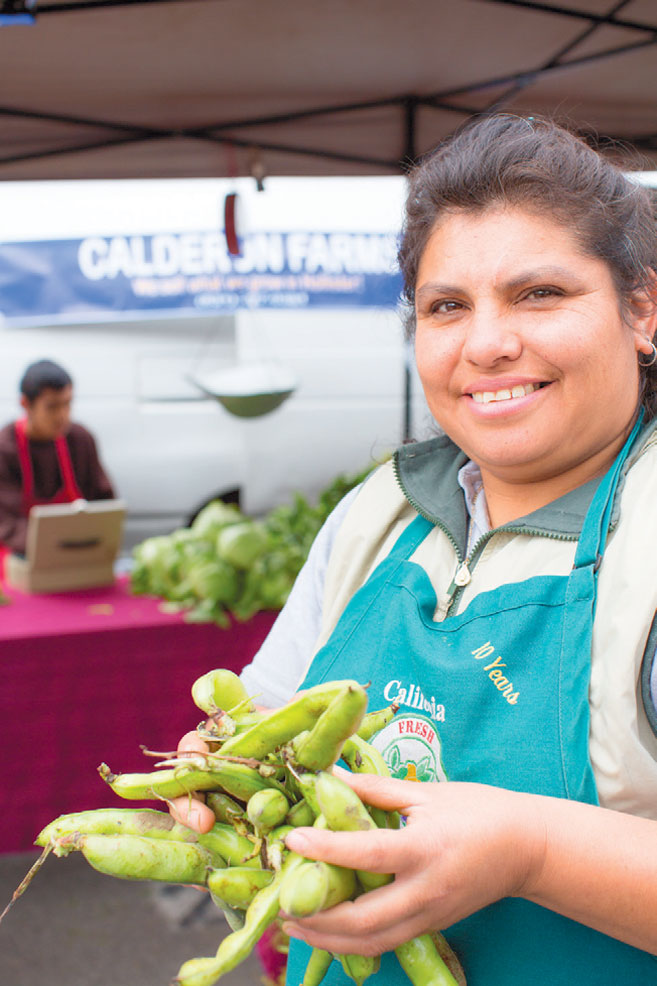
Araceli Trejo of Calderon Farms
“My worked changed a lot then,” says Araceli Trejo, 41, of that day two years ago when her husband passed away. “I used to do just sales before, but now I do the tractor, the planting, the cleaning, everything. And on the weekend, I go to the markets.”
Trejo never imagined she’d helm Calderon Farms solo. Named after her late husband, Raymundo Avila Calderon, the Hollister farm grows broccoli, cauliflower, beets, carrots, herbs and melons.
Back in 1998, the couple began as vendors for Avila Farms, owned by Raymundo’s brother Ruben. Later, her brother-in-law helped the young couple start their own farm. Today, 18 years later and recently widowed, Trejo enlists help from her son Javier, 16, and daughter Brianna, 18. They spend weekends working the Saratoga and Mountain View farmers markets, arriving early to set up their stall. The work is tough, but if Trejo gets her wish, her application to sell at additional markets will soon be accepted. The more selling opportunities, the better.
Born in Michoacán, Mexico, Trejo has lived in California since 1993 and hasn’t been back to Mexico since. Her children were born here.
As a woman in charge of her own agricultural livelihood, she has faced challenges. This past spring, her tractor broke and she wasn’t sure where to fix it. “I was looking for a person who would do a good job, but if I’m a woman, the person might take advantage of me because they assume I don’t know better.” Getting equipment repaired can be a lengthy ordeal, one that increases Trejo’s workload considerably. While the tractor’s in the shop, she must use a small rototiller, working the same field four or five times to get results.
Trejo, too, hopes customers understand farm work’s unpredictable, demanding nature. “Even if it’s hot or it’s raining, we have to harvest the vegetables.”
“But,” she adds, “you know what? Somebody has to do it. The people need food. I like to do it. I think I know how to do it. I like my work.”
[Callout “Even if it’s hot or it’s raining, we have to harvest the vegetables. But, you know what? Somebody has to do it. The people need food. I like to do it. I think I know how to do it. I like my work.” —Araceli Trejo]
---
Cheryl Sternman Rule is an award-winning San Jose food writer and the author of Yogurt Culture. She served as interim managing editor for this issue.



